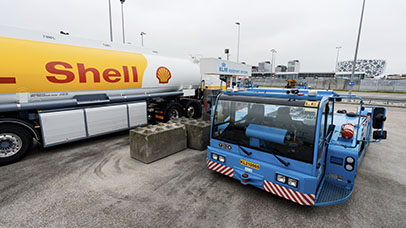Compliance
Shell invests significant time and resources in building processes to support accurate and timely compliance with tax legislation. We are committed to complying with the tax legislation of the many countries where we operate and seek to establish constructive relationships with tax authorities.
In 2019, Shell filed around 6,000 direct tax returns and around 37,000 indirect tax returns. We filed these on time in almost 100% of cases. We also processed more than 24,000 separate tax payments. A small number of returns may be submitted late. When this is the case, we carefully monitor the reasons, learn from them and pay any applicable late-filing fees. If we identify errors in our filings, we seek to address these with the relevant tax authorities.
Our tax compliance activities in 2019
Around 650 trained staff prepare, file and process our tax returns and payments. They are based in our business service centres in Poland, India, Malaysia and the Philippines. We also rely on a global team of around 335 tax experts who advise the business according to the Shell Responsible Tax Principles and our tax control framework. Where appropriate, we run training sessions for non-tax staff who need to be aware of tax compliance requirements.
Assurance and controls
Our Tax function supports the business by providing tax advice in line with commercial priorities and with regard for the local laws and fiscal regulations. We seek to comply with the letter and the spirit of the tax laws wherever we have a taxable presence.
Our tax control framework, policies and guidelines set out the standards, controls, risk management and assurance that establish boundaries for our tax activities. The framework helps us identify tax risks and sets out practical guidance for our staff, including the procedures for considering tax risks.
All ventures that we operate must conduct their activities in line with our business principles. The tax control framework is part of the Shell Control Framework, which applies to every Shell entity, including all employees and contract staff, and to Shell-operated ventures.
We monitor the effectiveness of our tax risk management and compliance with tax procedures and controls every year. External auditors regularly review our tax controls as part of the audit of our financial results.
Tax authorities in several countries, including the UK and the Netherlands, have granted Shell entities Authorised Economic Operator (AEO) status for customs duties. AEO is an internationally recognised status which indicates that Shell operates secure supply chains and has a strong compliance framework when it comes to customs processes and controls. One of the benefits of having AEO status is reduced reliance on physical and document-based customs controls.
We do not condone, encourage or support tax evasion. Compliance is embedded in the Shell General Business Principles and the Code of Conduct. Employees, contract staff and third parties with whom Shell has a business relationship may raise ethical and compliance concerns, anonymously if preferred, through the Shell Global Helpline.
In 2019, Shell’s Audit Committee discussed with management the key tax risks stemming from the evolving tax landscape, including intensified audit scrutiny and increasing demands for transparency. The Audit Committee also discussed measures under way in response to these trends and developments, including for example Shell’s publication of its first Tax Contribution Report in 2019.
Dealing with uncertainty
Our aim is to take sustainable tax positions in support of our business investments, which may be of a long-term nature. When we apply tax legislation, we do so with the reasonable expectation that our interpretation will be upheld in court. Sometimes, the law or how to apply it is unclear to taxpayers. In these situations, we may seek to find clarity by talking to the tax authority as part of a co-operative compliance arrangement.
A co-operative compliance arrangement is when we engage with tax authorities, providing them with real-time information before filing a tax return. We have had co-operative compliance arrangements with the tax authorities in the UK, the Netherlands, Singapore and Italy for a number of years. In 2019, we added Austria and we continue to explore possibilities for establishing more co-operative compliance relationships in other countries.
We also engaged in a dialogue with senior tax officials in Kazakhstan and have agreed to enter into a pilot co-operative compliance scheme.
When co-operative compliance arrangements are not available, we may seek to engage with a tax authority to disclose our application of the law.
In the case of transfer pricing, where there is uncertainty about the appropriate price for a particular intragroup transaction, we may apply for an advance pricing agreement (APA). Under an APA, the taxpayer and tax authority agree the transfer price that will apply before a tax return is submitted.
Sometimes, agreement on tax issues cannot be reached quickly with authorities and we seek to resolve any outstanding issues so that the tax return can be agreed.
The countries in which we operate have differing degrees of political, legal and fiscal stability. This exposes us to a wide range of political developments that could result in changes to contractual terms, laws and regulations. We continually monitor geopolitical developments and societal issues relevant to our interests.
Tax authorities in different countries can hold conflicting views about how the taxation of multinational enterprises should be interpreted or applied. When this lack of clarity occurs within a tax treaty or agreement between countries, we may use a mutual agreement procedure where the authorities aim to resolve the issue between themselves.
If we are still unable to reach an agreement with an authority, we may have to test the legal principle of the tax law concerned through the judicial system. However, we take this approach only when other options have not provided a resolution.
Brazil levy on Rio state oil extraction

Photo above: Botafogo service station, Rio de Janeiro, Brazil
In 2016, Brazil’s State of Rio de Janeiro imposed a value-added levy on oil extraction. Shell challenged the levy in court because it believed the obligations arising from the law were not legally sustainable. Shell obtained favourable injunctions suspending the enforcement of the law in two separate lawsuits, one filed to cover the year 2016 and the other covering 2017 onwards. The injunctions remain in effect and Shell received favourable decisions on the subject matter from the State Court. Rio de Janeiro State has appealed against both decisions. One is pending confirmation by the State Court while the other is pending final decisions by the Brazilian Superior and Supreme Courts. In addition, and as this is an industry-wide issue, the Brazilian Association of Oil and Gas Exploration and Production Companies, of which Shell is a member, filed a suit in February 2016 before the Brazilian Supreme Court, challenging the constitutionality of the law. This matter is currently pending with the Supreme Court. For further information on this case, see Note 25 in the Annual Report and Accounts.
Innovation for the future
We continue to improve the quality of our data through the use of technology, including analytical tools that aid testing, assessment and interpretation of data.
Tax authorities are increasingly implementing or expanding digital tax platforms, enabling businesses to file real-time tax returns. For example, Spain, Hungary and Poland have introduced digital VAT regimes that allow for the direct transfer of data from company reporting tools to the tax authorities.
We continue to improve data management to meet the growing demand for transparency. In 2019, we launched a process called "one click tax returns" in the USA, which analyses transactions subject to excise tax on a real-time basis for accuracy and completeness. Reviewing transactions as they occur supports Shell’s ability to file real-time tax returns.
We are also developing and deploying software for our reporting of indirect taxes. This software standardises, reconciles and classifies the data to aid preparation of the tax return with the appropriate tax treatment. In 2019, we piloted this in the Netherlands for VAT and excise duties. We plan to continue the programme in the Netherlands and roll it out further to the UK and Germany.
 Message from the Chief Financial Officer
Message from the Chief Financial Officer
 Shell’s approach to taxes
Shell’s approach to taxes
 Special topics
Special topics
 Our tax data
Our tax data
